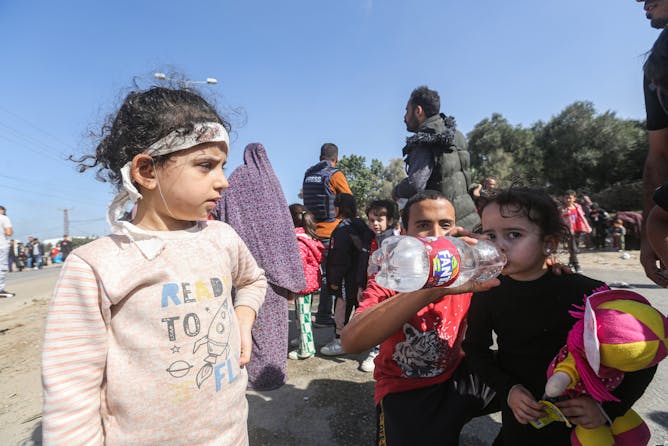|
As Israel has carried out its military operation against Hamas over the past five weeks – first with airstrikes, and now a ground operation – the United States has stood resolutely by its side.
As Middle East expert Ian Parmeter writes for us, though, there are now signs of tension emerging between Israeli Prime Minister Benjamin Netanyahu’s government and the Biden administration.
As Israeli troops have encircled Al-Shifa hospital in Gaza, for instance, US President Joe Biden made his concerns known, saying “hospitals must be protected”.
As calls for a ceasefire grow louder around the world, Parmeter says Netanyahu is facing increasing scrutiny over his war strategy, as well as questions about his postwar plans for the Gaza Strip.
Some of this pressure is coming from the US, which is increasingly concerned about rising civilian casualties and an apparent lack of an exit strategy. Biden and Netanyahu may be on a collision course, Parmeter writes.
In another piece today, Ritesh Shah, an education expert from the University of Auckland, details the three-year study he led exploring children’s wellbeing in Gaza, East Jerusalem and the West Bank.
The trends his team observed were cause for grave concern – even before events of the past month, he writes.
Lastly, one in six people around the world has been exposed to conflict this year. While our natural instinct is to worry about or grieve the people affected, war is also terrible for the environment, as Stacey Pizzino writes.
Artillery fire wipes out forests. Landmines maim animals and humans, or wash up after climate-fuelled flooding. Toxic chemicals lace the soils. If all the world’s military forces were a country, they would pump out enough greenhouse gases to be the fourth-highest emitter.
|

|
Justin Bergman
International Affairs Editor
|
|

Ian Parmeter, Australian National University
With so many questions left unanswered, there is a growing disconnect between Netanyahu and the Biden administration in the US.
|

Ritesh Shah, University of Auckland
A four-year survey of Palestinian school children in Gaza, the West Bank and East Jerusalem found hope and wellbeing already seriously declining. The situation now can only make it worse.
|

Stacey Pizzino, The University of Queensland; Jo Durham, Queensland University of Technology; Michael Waller, The University of Queensland
Wars are multiplying – and the damage these conflicts do isn’t just immediate. They leave long-term environmental damage
|

Colleen Murrell, Dublin City University
If the first casualty of war is truth, it’s not often the fault of the journalists on the frontline who do a tough job in difficult circumstances.
|

Peter Martin, Crawford School of Public Policy, Australian National University
Life hasn’t been this unaffordable in Australia in 40 years. There’s still time to redesign tax cuts starting next July – which would give $9,000 to high earners but just $1,000 to ordinary earners.
|

Kevin McConkey, UNSW Sydney
The project, spanning researchers across science and the humanities, looks at how ‘research assessment’ affects research in Australia.
|

James Ogloff, Swinburne University of Technology
This is a problem for everyone. Research shows mental health intervention and engagement helps reduce offending among people with serious mental illness who commit offences.
|

Chris Vasantkumar, Macquarie University
Electronic payments are convenient and are increasingly replacing cash, but when a network fails, the impact can bring a country to a halt.
|

Tashi Dema, University of New England
Social media is giving a new lifeline to Bhutan’s native languages, which do not have written script and lack proper documentation.
|

Gary Sacks, Deakin University; Alexandra Jones, George Institute for Global Health
Our new study analysed the packages of around 8,000 food and drink products to understand the marketing techniques used.
|
Politics + Society
|
-
Justin Ellis, University of Newcastle; Nicole L. Asquith, University of Tasmania
The New South Wales Special Commission of Inquiry into LGBTIQ hate crimes has held its final public sitting in Sydney today. It’s been dogged in its pursuit of justice for victims and their families.
-
Michelle Grattan, University of Canberra
He is the second Coalition MP to defect to the crossbench this term. The other is Andrew Gee, who left the Nationals over the party’s opposition to the Voice. The crossbench in the House now numbers 18.
-
Susan Hutchinson, Australian National University
Some 189,000 Afghans have applied for visas to Australia, but the government has only approved 31,500 refugee spots for the next four years. Women face the biggest hurdles to resettlement.
|
|
|
|
Science + Technology
|
-
Quoc Phuong Tran, UNSW Sydney
Scientists have known about the ‘formose reaction’ for 160 years. New research shows how it could have played a key role in the creation of life.
-
Anya Schiffrin, Columbia University; Haaris Mateen, University of Houston
Our research is the first to estimate what the tech giants owe publishers. The actual sums paid out are usually covered by non-disclosure agreements.
-
Mark A Gregory, RMIT University
Optus says the unprecedented outage last week was caused by a ‘routine software upgrade’. An expert explains why this points to more serious problems with the network.
|
|
Environment + Energy
|
-
Danie Nilsson, CSIRO; Rachael Vorwerk, RMIT University
Understanding the success of the ABC’s War on Waste is a lesson in behavioural psychology. Research reveals five ways to guide other entertainment-education interventions to similar success.
-
Kiri Joy Wallace, University of Waikato; John Reid, University of Canterbury; Penny Payne, University of Waikato
Technologies such as remote sensing and artificial intelligence are making it easier to gather more accurate data on biodiversity. Developing these digital tools will help vital ecosystem restoration.
|
|
Books + Ideas
|
-
Charles Barbour, Western Sydney University
In The Manic, Benjamin Labatut tells the story of the ‘smartest man of the 20th century’.
|
|
| |
|
|
|
The Conversation AU
Melbourne VIC, Australia
•
Full Time
|

|
|
The Conversation AU
Melbourne VIC, Australia
•
Full Time
|

|
|
The Conversation AU
Melbourne VIC, Australia
•
Full Time
|

|
|
|
|
| |
| |

|
| |
| |
| |
Featured Events, Courses & Podcasts
|
View all
|
|
1 January 2023 - 7 October 2026
•
|

|
21 - 22 November 2023
•
Melbourne
|

|
|
|

|
16 November 2023
•
Sydney
|

|
|
|
|
| |
| |
| |
| |
| |
|
|